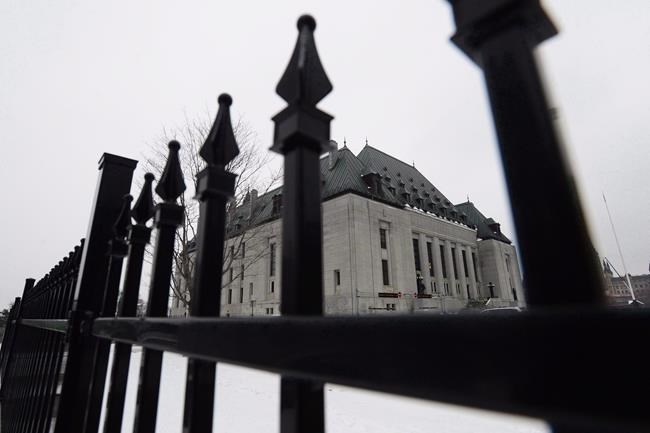OTTAWA — A Manitoba man's right to a speedy trial was not breached when the trial judge took nine months to deliberate and issue his verdict, the Supreme Court of Canada said Friday.
The judges were unanimous that deliberations by a judge cannot be unreasonably long but are not included in the 30-month time limit set by the Supreme Court in the 2016 "Jordan" case.
In that pivotal decision, the top court set out rules meant to ensure that lower courts respect an accused's right to a trial within a reasonable time, as guaranteed in the Charter of Rights and Freedoms.
That included that the time from charges being laid until the end of a trial should be no longer than 18 months for cases heard in provincial courts and 30 months for those heard in superior courts, with rare exceptions.
A man known only as K.G.K. to protect the identity of the minor victim in the case argued that his rights were violated when a Manitoba Court of Queen's Bench judge took nine months to deliberate before convicting him of sexual assault, sexual interference and invitation to sexual touching.
The trial itself was completed before the Jordan decision was delivered in July 2016, but the verdict came three months after Jordan. In all, it was 42 months from the time K.G.K. was charged until the verdict was given.
The Manitoba Court of Appeal disagreed with K.G.K. but because the decision was not unanimous it automatically went to the Supreme Court for appeal.
The high court heard the case in September in Winnipeg, the first time in the court's history it heard a case outside of Ottawa.
K.G.K.'s lawyer argued that the Jordan ceiling must include the deliberation period, but in Friday's decision, the Supreme Court disagreed.
"Properly construed, the Jordan ceilings apply from the date of the charge until the actual or anticipated end of the evidence and argument," wrote Justice Michael Moldaver in the decision.
The ruling says a judge's time to deliberate is included in an accused's general right to be tried in a reasonable amount of time, but outside the specific 18- and 30-month ceilings the Supreme Court has set.
The court did not say exactly how much time a judge can take but did set out some tests for it, including comparing it to how long decisions took in similar cases. Judges should also at least note how close to the Jordan time limit the trial got.
In this case, they said the nine-month deliberation time was close to the line but was ultimately not unreasonable.
The judges said including deliberations in the 30-month ceiling is impractical, because if a complex case takes almost that long to allow hearing all the witnesses and evidence, a judge cannot be expected to rush to a verdict just to meet the limit.
As well they said the Jordan ceilings were established to correct a systemic problem of criminal cases taking too long, but they said the time it was taking judges to deliberate and issue verdicts was not part of that systemic issue.
K.G.K. had also argued the case should be stayed because the trial itself took longer than the 30 months allowed in Jordan, but because this case was heard before the Jordan ruling it was considered to be part of a transition phase. The Supreme Court decided the time for the trial was fine under the transitional rules.
This report by The Canadian Press was first published March 20, 2020.
Mia Rabson, The Canadian Press



